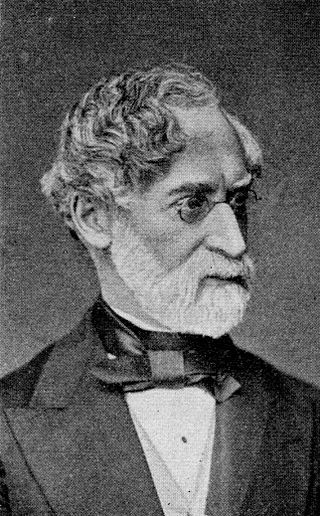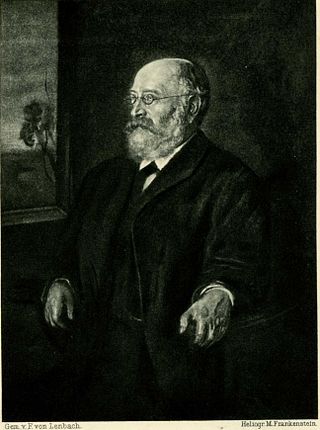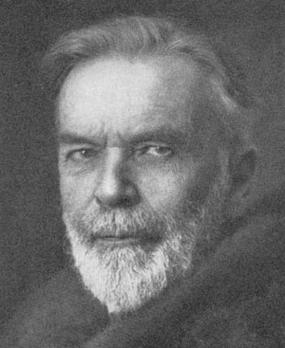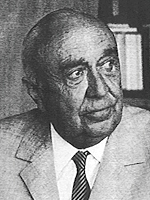
Karl Viktor Müllenhoff was a German philologist who specialized in Germanic studies.

Theodor Gomperz, Austrian philosopher and classical scholar, was born at Brno (Brünn).

Moritz Steinschneider was a Moravian bibliographer and Orientalist. He is credited as having invented the term antisemitism.

The Seven Wise Masters is a cycle of stories of Sanskrit, Persian or Hebrew origins.

Muspilli is an Old High German alliterative verse poem known in incomplete form from a ninth-century Bavarian manuscript. Its subject is the fate of the soul immediately after death and at the Last Judgment. Many aspects of the interpretation of the poem, including its title, remain controversial among scholars.
Rudolf von Raumer was a German philologist and linguist, known for his extensive research of the German language. He was the son of geologist Karl Georg von Raumer.
Julius Ludwig Friedrich Weizsäcker was a German historian. He specialized in medieval history and early modern history. A member of the distinguished Weizsäcker family, his brother was the Protestant theologian Karl Heinrich Weizsäcker.

Wilhelm Ludwig Geiger was a German Orientalist in the fields of Indo-Iranian languages and the history of Iran and Sri Lanka. He was known as a specialist in Pali, Sinhala language and the Dhivehi language of the Maldives. He is especially known for his work on the Sri Lankan chronicles Mahāvaṃsa and Cūlavaṃsa and made critical editions of the Pali text and English translations with the help of assistant translators.
The Institute of Modern Languages Research is a research institution associated with the University of London. A constituent institute of the School of Advanced Study based on the second floor of the Senate House, the Institute of Modern Languages Research promotes and facilitates national and international collaborative, cross-disciplinary and cross-cultural research by means of seminars, lectures, workshops, colloquia, conferences, a fellowships programme, and its various research centres. In October 2022, it changed its name to Institute of Languages, Cultures and Societies.

Alfred Theophil Holder was an Austrian philologist, historian, and librarian. A specialist of Latin literature and Roman history, he is best known for his editions of Horace, Caesar, Tacitus, and Avianus, as well as for his three-volume lexicon of ancient Celtic languages entitled Alt-celtischer Sprachschatz (1891–1913).

Friedrich Maurer was a German philologist who specialized in Germanic studies.

Der Busant, also known as Der Bussard, is a Middle High German verse narrative, containing 1074 lines of rhyming couplets. The story tells of a love affair between the Princess of France and the Prince of England, who elope but are separated after a buzzard steals one of the princess's rings. After more than a year of separation, with the prince having gone mad and living as a wild man, they are reunited.
August Max Closs was a professor of German studies. Born in Austria, he studied German and English language and literature, and in 1929 moved to London. There he taught at University College, and became friends with the German scholar Robert Priebsch, whose daughter Hannah he married. In 1931 he began teaching at the University of Bristol, where he stayed until his retirement in 1964. He was a prolific author on and editor and anthologizer of German poetry. In addition, he was a dedicated collector of manuscripts and books; part of his collection was sold to Princeton University, and the rest forms the Priebsch-Closs Collection Institute of Germanic and Romance Studies. He is remembered also for his efforts to bring about German-English reconciliation after the Second World War, especially between the cities of Bristol and Hannover.
Hannah Margaret Mary Closs (1905-1953) was an art critic and novelist. She wrote three novels and a book on aesthetics.
Elias von Steinmeyer was a German philologist.
The Zeitschrift für deutsches Altertum und deutsche Literatur is a quarterly peer-reviewed academic journal in the field of German studies with emphasis on the older periods. It was established in 1841 and is the oldest periodical in early Germanic studies still publishing.
Georg Jacob was a scholar of Islamic studies and an Orientalist. He founded Turkology as a modern academic discipline in Germany.
As of 2018, ten firms in Germany rank among the world's biggest publishers of books in terms of revenue: C.H. Beck, Bertelsmann, Cornelsen Verlag, Haufe-Gruppe, Holtzbrinck Publishing Group, Ernst Klett Verlag, Springer Nature, Thieme, WEKA Holding, and Westermann Druck- und Verlagsgruppe. Overall, "Germany has some 2,000 publishing houses, and more than 90,000 titles reach the public each year, a production surpassed only by the United States." Unlike many other countries, "book publishing is not centered in a single city but is concentrated fairly evenly in Berlin, Hamburg, and the regional metropolises of Cologne, Frankfurt, Stuttgart, and Munich."
Ernst Schwarz was an Austro-Hungarian-born German philologist who was Professor of Ancient German language and Literature at Charles University, and later Professor of Germanic and German Philology at the University of Erlangen–Nuremberg. Schwarz specialized in Germanic studies, especially dialectology and onomastics, with a particular focus on the Sudeten Germans.
Georg Paul Rudolf Meissner or Meißner or Meiszner was a German philologist who specialized in Germanic studies.









